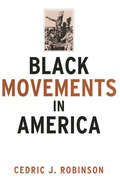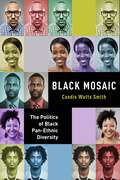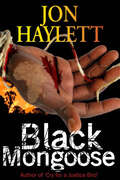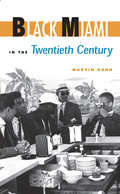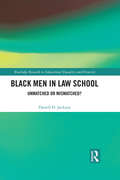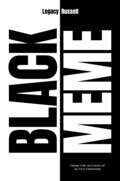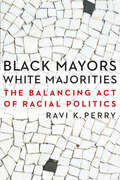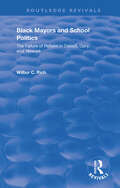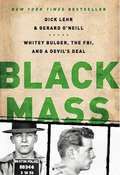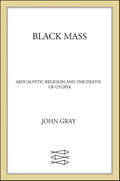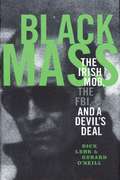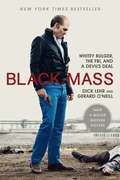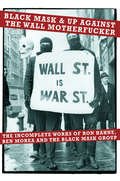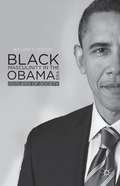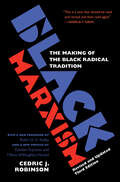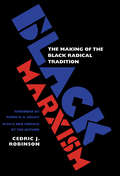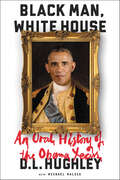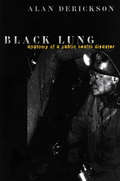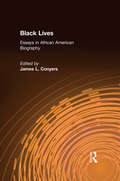- Table View
- List View
Black Movements in America
by Cedric J. RobinsonCedric Robinson traces the emergence of Black political cultures in the United States from slave resistances in the 16th and 17th centuries to the civil rights movements of the present. Drawing on the historical record, he argues that Blacks have constructed both a culture of resistance and a culture of accommodation based on the radically different experiences of slaves and free Blacks.
Black Mosaic: The Politics of Black Pan-Ethnic Diversity
by Candis Watts SmithHistorically, Black Americans have easily found common ground on political, social, and economic goals. Yet, there are signs of increasing variety of opinion among Blacks in the United States, due in large part to the influx of Afro-Latino, Afro-Caribbean, and African immigrants to the United States. In fact, the very definition of “African American” as well as who can self-identity as Black is becoming more ambiguous. Should we expect African Americans’ shared sense of group identity and high sense of group consciousness to endure as ethnic diversity among the population increases? In Black Mosaic, Candis Watts Smith addresses the effects of this dynamic demographic change on Black identity and Black politics.Smith explores the numerous ways in which the expanding and rapidly changing demographics of Black communities in the United States call into question the very foundations of political identity that has united African Americans for generations. African Americans’ political attitudes and behaviors have evolved due to their historical experiences with American Politics and American racism. Will Black newcomers recognize the inconsistencies between the American creed and American reality in the same way as those who have been in the U.S. for several generations? If so, how might this recognition influence Black immigrants’ political attitudes and behaviors? Will race be a site of coalition between Black immigrants and African Americans? In addition to face-to-face interviews with African Americans and Black immigrants, Smith employs nationally representative survey data to examine these shifts in the attitudes of Black Americans. Filling a significant gap in the political science literature to date, Black Mosaic is a groundbreaking study about the state of race, identity, and politics in an ever-changing America.
Black Morocco
by Chouki El HamelBlack Morocco: A History of Slavery, Race and Islam chronicles the experiences, identity, and achievements of enslaved black people in Morocco from the sixteenth century to the beginning of the twentieth century. Chouki El Hamel argues that we cannot rely solely on Islamic ideology as the key to explain social relations and particularly the history of black slavery in the Muslim world, for this viewpoint yields an inaccurate historical record of the people, institutions, and social practices of slavery in Northwest Africa. El Hamel focuses on black Moroccans' collective experience beginning with their enslavement to serve as the loyal army of the Sultan Isma'il. By the time the Sultan died in 1727, they had become a political force, making and unmaking rulers well into the nineteenth century. The emphasis on the political history of the black army is augmented by a close examination of the continuity of black Moroccan identity through the musical and cultural practices of the Gnawa.
Black Mongoose
by Jon HaylettA &“fast-paced, sexy and blood-spattered&” political thriller set in Africa from the award-winning author of Cry of the Justice Bird (Robert Guest, international bestselling author of The Shackled Continent). USuzwe is an African country rotten with corruption. Its rulers systematically pillage the economy, rob the charities and drain the aid budgets of gullible Western countries. However, a group of citizens rebel against the poverty, food shortages, bankrupt social services, disease and early deaths and plan to topple the regime within a week—and their unsuspecting instrument is ex-Royal Marine Commando Johnny Strowger. Johnny arrives in the Kingdom of USuzwe like any other tourist, intent on enjoying its palm-fringed beaches, game parks and beautiful girls. But when his brother mysteriously disappears, he finds himself the object of a huge police manhunt. Guided by Ephraim and the beautiful Lindiwe Dhlimani, Johnny begins to destroy the political snakes of Kisingo&’s regime, but at a terrible price. &“Black Mongoose is a terrific novel . . . Jon Haylett writes hard-boiled fiction with tremendous energy and an eye for unsettling truths.&”—Robert Guest, former Africa editor of The Economist and international bestselling author
Black Miami in the Twentieth Century (Florida History and Culture)
by Marvin DunnThe first book devoted to the history of African Americans in south Florida and their pivotal role in the growth and development of Miami, Black Miami in the Twentieth Century traces their triumphs, drudgery, horrors, and courage during the first 100 years of the city's history. Firsthand accounts and over 130 photographs, many of them never published before, bring to life the proud heritage of Miami's black community.Beginning with the legendary presence of black pirates on Biscayne Bay, Marvin Dunn sketches the streams of migration by which blacks came to account for nearly half the city’s voters at the turn of the century. From the birth of a new neighborhood known as "Colored Town," Dunn traces the blossoming of black businesses, churches, civic groups, and fraternal societies that made up the black community. He recounts the heyday of "Little Broadway" along Second Avenue, with photos and individual recollections that capture the richness and vitality of black Miami's golden age between the wars.A substantial portion of the book is devoted to the Miami civil rights movement, and Dunn traces the evolution of Colored Town to Overtown and the subsequent growth of Liberty City. He profiles voting rights, housing and school desegregation, and civil disturbances like the McDuffie and Lozano incidents, and analyzes the issues and leadership that molded an increasingly diverse community through decades of strife and violence. In concluding chapters, he assesses the current position of the community--its socioeconomic status, education issues, residential patterns, and business development--and considers the effect of recent waves of immigration from Latin America and the Caribbean.Dunn combines exhaustive research in regional media and archives with personal interviews of pioneer citizens and longtime residents in a work that documents as never before the life of one of the most important black communities in the United States.
Black Men’s Health: A Strengths-Based Approach Through a Social Justice Lens for Helping Professions
by Yarneccia D. Dyson Vanessa Robinson-Dooley Jerry WatsonNow more than ever there is a need to focus on Black men's health in higher education and ensure that future practitioners are trained to ethically and culturally serve this historically oppressed community. This textbook provides practical insight and knowledge that prepare students to work with Black men and their families from a strengths-based and social justice lens. There is a dearth in the literature that discusses the prioritization of Black men’s health within the context of how they are viewed by societal approaches to engage them in research, and health programming aimed at increasing their participation in health services to decrease their morbidity and mortality rates. Much of the extant literature is over 10 years old and doesn't account for social determinants of health, perceptions of health status, as well as social justice implications that can affect the health outcomes of this historically oppressed population including structural and systemic racism as well as police brutality and gun violence.The book's 13 chapters represent a diversity of thought and perspectives of experts reflective of various disciplines and are organized in four sections:Part I - Racial Disparities and Black MenPart II - Black Masculinity Part III - Black Men in Research Part IV - Social Justice Implications for Black Men's Health Black Men’s Health serves as a core text across multiple disciplines and can be utilized in undergraduate- and graduate-level curriculums. It equips students and educators in social work, nursing, public health, and other helping professions with the knowledge and insight that can be helpful in their future experiences of working with Black men or men from other marginalized racial/ethnic groups and their families/social support systems. Scholars, practitioners, and academics in these disciplines, as well as community-based organizations who provide services to Black men and their families, state agencies, and evaluation firms with shared interests also would find this a useful resource.
Black Men in Law School: Unmatched or Mismatched (Routledge Research in Educational Equality and Diversity)
by Darrell D. JacksonGrounded in Critical Race Theory (CRT), Black Men in Law School refutes the claim that when African American law students are "mismatched" with more selective law schools, the result is lower levels of achievement and success. Presenting personal narratives and counter-stories, Jackson demonstrates the inadequacy of the mismatch theory and deconstructs the ways race is constructed within American public law schools. Calling for a replacement to mismatch theory, Jackson offers an alternative theory that considers marginalized student perspectives and crystallizes the nuances and impact that historically exclusionary institutions and systems have on African American law school students. To further the debate on affirmative action, this book shows that experiences and voices of African American law school students are a crucial ingredient in the debate on race and how it functions in law schools.
Black Meme: A History of The Images That Make Us
by Legacy Russell"Unsettles, expands and deepens our understanding of the black meme...necessary reading; brilliant and utterly convincing."–Christina Sharpe, author of Ordinary Notes"You will be galvanized by Legacy Russell&’s analytic brilliance and visceral eloquence." –Margo Jefferson, author of Constructing a Nervous SystemA history of Black imagery that recasts our understanding of visual culture and technology In Black Meme, Legacy Russell, award-winning author of the groundbreaking Glitch Feminism, explores the &“meme&” as mapped to Black visual culture from 1900 to the present, mining both archival and contemporary media. Russell argues that without the contributions of Black people, digital culture would not exist in its current form. These meditations include the circulation of lynching postcards; why a mother allowed Jet magazine to publish a picture of her dead son, Emmett Till; and how the televised broadcast of protesters in Selma changed the debate on civil rights. Questions of the media representation of Blackness come to the fore as Russell considers how a citizen-recorded footage of the LAPD beating Rodney King became the first viral video. And the Anita Hill hearings shed light on the media&’s creation of the Black icon. The ownership of Black imagery and death is considered in the story of Tamara Lanier&’s fight to reclaim the daguerreotypes of her enslaved ancestors from Harvard. Meanwhile the live broadcast on Facebook of the murder of Philando Castile by the police after he was stopped for a broken taillight forces us to bear witness to the persistent legacy of the Black meme. Through imagery, memory and technology Black Meme shows us how images of Blackness have always been central to our understanding of the modern world.
Black Mayors, White Majorities: The Balancing Act of Racial Politics (Justice and Social Inquiry)
by Ravi K. PerryRecent years have seen an increase in the number of African Americans elected to political office in cities where the majority of their constituents are not black. In the past, the leadership of black politicians was characterized as either &“deracialized&” or &“racialized&”—that is, as either focusing on politics that transcend race or as making black issues central to their agenda. Today many African American politicians elected to offices in non-majority-black cities are adopting a strategy that universalizes black interests as intrinsically relevant to the needs of their entire constituency. In Black Mayors, White Majorities Ravi K. Perry explores the conditions in which black mayors of majority-white cities are able to represent black interests and whether blacks&’ historically high expectations for black mayors are being realized. Perry uses Toledo and Dayton, Ohio, as case studies, and his analysis draws on interviews with mayors and other city officials, business leaders, and heads of civic organizations, in addition to official city and campaign documents and newspapers. Perry also analyzes mayoral speeches, the 2001 ward-level election results, and city demographics. Black Mayors, White Majorities encourages readers to think beyond the black-white dyad and instead to envision policies that can serve constituencies with the greatest needs as well as the general public.
Black Mayors and School Politics: The Failure of Reform in Detroit, Gary and Newark
by Wilbur C RichFirst Published in 1996. Some people believe that if inner-city black children had excellent schools, they would perform better in them. Granted, schools are a part of the problem, but they are not all of the solution. Schools are only buildings where teachers, administrators, and students interact. Learning is a more much complex process. There are many forces arrayed against an inner-city child that preclude him/her from mastering the education process. Among these forces are poverty, family instability, disruptive classroom environments, and incompetent teachers. There seems to be no end to research and speculation about how to overcome these forces. However, the author asserts that the gap between black and white children continues to widen. With research beginning in 1989, exploring three school systems for this study: Detroit, Michigan; Gary, Indiana; and Newark, New Jersey. The book presents a systematic survey of school politics in these three cities, giving particular emphasis to local reform efforts.
Black Mass: Whitey Bulger, the FBI, and a Devil's Deal
by Dick Lehr Gerard O'NeillJohn Connolly and James "Whitey" Bulger grew up together on the tough streets of South Boston. Decades later in the mid-1970s, they met again. By then, Connolly was a major figure in the FBI's Boston office and Whitey had become godfather of the Irish Mob. Connolly had an idea, a scheme that might bring Bugler into the FBI fold and John Connolly into the Bureau's big leagues. But Bulger had other plans. Soon to be a major motion picture starring Johnny Depp as Whitey Bulger, Black Mass is the chilling true story of what happened between them--a dark deal that spiraled out of control, leading to drug dealing, racketeering, and murder.
Black Mass: Apocalyptic Religion and the Death of Utopia
by John GrayFor the decade that followed the end of the cold war, the world was lulled into a sense that a consumerist, globalized, peaceful future beckoned. The beginning of the twenty-first century has rudely disposed of such ideas—most obviously through 9/11and its aftermath. But just as damaging has been the rise in the West of a belief that a single model of political behavior will become a worldwide norm and that, if necessary, it will be enforced at gunpoint.In Black Mass, celebrated philosopher and critic John Gray explains how utopian ideals have taken on a dangerous significance in the hands of right-wing conservatives and religious zealots. He charts the history of utopianism, from the Reformation through the French Revolution and into the present. And most urgently, he describes how utopian politics have moved from the extremes of the political spectrum into mainstream politics, dominating the administrations of both George W. Bush and Tony Blair, and indeed coming to define the political center. Far from having shaken off discredited ideology, Gray suggests, we are more than ever in its clutches. Black Mass is a truly frightening and challenging work by one of Britain's leading political thinkers.
Black Mass
by Dick Lehr Gerard O'NeillTwo boys - John Connolly and James "Whitley" Bulger - grew up together on the streets of South Boston. Decades later, in the mid-1970s, they would meet again. By then, Connolly was a major figure in the FBI's Boston office and Whitley had become godfather of the Irish mob. Connolly had an idea, a scheme that might bring Bulger into the FBI fold and John Connolly into the Bureau's big leagues. But Bulger had other plans. "Black Mass" is the story of what happened beween them - a dark deal to trade secrets and take down Boston's Italian Mafia in exchange for "immunity" - that spiralled out of control, leading to murders, drug dealing and racketeering indictments. Ultimately, in what would become the biggest internal scandal in the history of the FBI, Bulger would find himself at the top of the FBI's Ten Most Wanted List. Told in gripping narrative style by the "Boston Globe" reporters who covered the case from the beginning, "Black Mass" is a riveting epic crime story that is also a book about Irish America, about the pull of place, and about the ties that bind.
Black Mass
by Dick Lehr Gerard O'NeillJohn Connolly and James "Whitey" Bulger grew up together on the tough streets of South Boston. Decades later in the mid-1970s, they met again. By then, Connolly was a major figure in the FBI's Boston office and Whitey had become godfather of the Irish Mob. Connolly had an idea, a scheme that might bring Bugler into the FBI fold and John Connolly into the Bureau's big leagues. But Bulger had other plans. Soon to be a major motion picture starring Johnny Depp as Whitey Bulger, Black Mass is the chilling true story of what happened between them--a dark deal that spiraled out of control, leading to drug dealing, racketeering, and murder.
Black Mass
by Dick Lehr Gerard O'NeillJohn Connolly and James "Whitey" Bulger grew up together on the tough streets of South Boston. Decades later in the mid-1970s, they met again. By then, Connolly was a major figure in the FBI's Boston office and Whitey had become godfather of the Irish Mob. Connolly had an idea, a scheme that might bring Bugler into the FBI fold and John Connolly into the Bureau's big leagues. But Bulger had other plans. Soon to be a major motion picture starring Johnny Depp as Whitey Bulger, Black Mass is the chilling true story of what happened between them--a dark deal that spiraled out of control, leading to drug dealing, racketeering, and murder.
Black Mask & Up Against the Wall Motherfucker: The Incomplete Works of Ron Hahne, Ben Morea, and the Black Mask Group
by Ron Hahne Ben MoreaChronicling the history of two New York City provocateur groups—Black Mask and Up Against the Wall, Motherfucker—this account complies the complete 10 issues of the newspaper Black Mask; numerous leaflets, articles, and flyers generated by Black Mask; the Up Against the Wall Motherfucker Magazine; and Free Press and Rolling Stone reports on Up Against the Wall, Motherfucker. Founded in the mid-1960s, the Black Mask group melded the ideas and inspiration of Dada with the anarchism of the Spanish Revolution, and this volume demonstrates how they heavily influenced the art, politics, and culture of the decade as they briefly shut down the Museum of Modern Art, protested Wall Street, battled at Students for a Democratic Society conferences, and defended the shooting of Andy Warhol. This history then details how in 1968 Black Mask reorganized as Up Against the Wall, Motherfucker, which combined the confrontational theater and tactics of Black Mask with a much more aggressive approach in dealing with the police and authorities. A lengthy interview with founder Ben Morea provides context and color to this fascinating documentary legacy.
Black Masculinity In The Obama Era
by William T. HostonBlack Masculinity in the Obama Era provides an in-depth examination of the current state of black males and identifies the impact of living in the Obama era. In the era of the first black president, Barack H. Obama, this book gauges the status of black masculinity and provokes discourse to discover whether his election and presence has had an influential impact on black male achievement. A purposeful sample of black males was asked, what does it mean to be a black male in the 21st century? Throughout the interviews with black males, we learn that the 'Obama Effect' has not had the intended impact on black male achievement and black males continue to be plagued by structural and cultural forces that have historically burdened their plight and level of achievement.
Black Marxism, Revised and Updated Third Edition: The Making of the Black Radical Tradition
by Cedric J. RobinsonIn this ambitious work, first published in 1983, Cedric Robinson demonstrates that efforts to understand Black people's history of resistance solely through the prism of Marxist theory are incomplete and inaccurate. Marxist analyses tend to presuppose European models of history and experience that downplay the significance of Black people and Black communities as agents of change and resistance. Black radicalism, Robinson argues, must be linked to the traditions of Africa and the unique experiences of Blacks on Western continents, and any analyses of African American history need to acknowledge this. To illustrate his argument, Robinson traces the emergence of Marxist ideology in Europe, the resistance by Blacks in historically oppressive environments, and the influence of both of these traditions on such important twentieth-century Black radical thinkers as W. E. B. Du Bois, C. L. R. James, and Richard Wright. This revised and updated third edition includes a new preface by Tiffany Willoughby-Herard, and a new foreword by Robin D. G. Kelley.
Black Marxism
by Cedric J. RobinsonIn this ambitious work, first published in 1983, Cedric Robinson demonstrates that efforts to understand black people's history of resistance solely through the prism of Marxist theory are incomplete and inaccurate. Marxist analyses tend to presuppose European models of history and experience that downplay the significance of black people and black communities as agents of change and resistance. Black radicalism must be linked to the traditions of Africa and the unique experiences of blacks on western continents, Robinson argues, and any analyses of African American history need to acknowledge this.To illustrate his argument, Robinson traces the emergence of Marxist ideology in Europe, the resistance by blacks in historically oppressive environments, and the influence of both of these traditions on such important twentieth-century black radical thinkers as W. E. B. Du Bois, C. L. R. James, and Richard Wright.
Black Markets and Militants: Informal Networks in the Middle East and Africa
by Khalid Mustafa MedaniBlack Man, White House: An Oral History of the Obama Years
by Michael Malice D. L. HughleyNew York Times Bestseller (Humor)"The book everyone is laughing about!"--Joe Scarborough, Morning JoeFrom legendary comedian D.L. Hughley comes a bitingly funny send-up of the Obama years, as “told” by the key political players on both sides of the aisle.What do the Clintons, Republicans, fellow Democrats, and Obama’s own family really think of President Barack Obama? Finally, the truth is revealed in this raucously funny “oral history” parody.There is no more astute—and hilarious—critic of politics, entertainment, and race in America than D. L. Hughley, famed comedian, radio star, and original member of the “Kings of Comedy.” In the vein of Jon Stewart’s America: The Book, Black Man, White House is an acerbic and witty take on Obama’s two terms, looking at the president’s accomplishments and foibles through the imagined eyes of those who saw history unfold.Hughley draws upon satirical interviews with the most notorious public figures of our day: Mitt Romney (“What’s ‘poverty’? Is that some sort of rap jargon?”); Nancy Pelosi (“I play F**k/Marry/Kill, and there’s a lot more kills than fu**ks in Congress, believe me.”); Rod Blagojevich (“You can’t sell political offices on eBay; I discovered that personally.”); Joe Biden (“I like wrestling.”); and other politicians, media pundits, and buffoons. It is sure to be the most irreverent—and perhaps the most honest—look at American politics today.
Black Lung: Anatomy of a Public Health Disaster
by Alan DericksonIn the definitive history of a twentieth-century public health disaster, Alan Derickson recounts how, for decades after methods of prevention were known, hundreds of thousands of American miners suffered and died from black lung, a respiratory illness caused by the inhalation of coal mine dust. The combined failure of government, medicine, and industry to halt the spread of this disease--and even to acknowledge its existence--resulted in a national tragedy, the effects of which are still being felt. The book begins in the late nineteenth century, when the disorders brought on by exposure to coal mine dust were first identified as components of a debilitating and distinctive illness. For several decades thereafter, coal miners' dust disease was accepted, in both lay and professional circles, as a major industrial disease. Derickson describes how after the turn of the century medical professionals and industry representatives worked to discredit and supplant knowledge about black lung, with such success that this disease ceased to be recognized. Many authorities maintained that breathing coal mine dust was actually beneficial to health. Derickson shows that activists ultimately forced society to overcome its complacency about this deadly and preventable disease. He chronicles the growth of an unprecedented movement--from the turn-of-the-century miners' union, to the social medicine activists in the mid-twentieth century, and the black lung insurgents of the late sixties--which eventually won landmark protections and compensation with the enactment of the Federal Coal Mine Health and Safety Act in 1969. An extraordinary work of scholarship, Black Lung exposes the enormous human cost of producing the energy source responsible for making the United States the world's preeminent industrial nation.
Black Lives: Essays in African American Biography
by James L. ConyersThe chapters in this text comprise biographical sketches of previously unknown (or lesser known) African-Americans, among them General Daniel Chappie James Jr; William Levi Dawson (composer); Vinnette Carroll (director and playwright); and Elizabeth Ross Haynes (political speaker and activist).
Black Lives and Spatial Matters: Policing Blackness and Practicing Freedom in Suburban St. Louis (Police/Worlds: Studies in Security, Crime, and Governance)
by Jodi RiosBlack Lives and Spatial Matters is a call to reconsider the epistemic violence that is committed when scholars, policymakers, and the general public continue to frame Black precarity as just another racial, cultural, or ethnic conflict that can be solved solely through legal, political, or economic means. Jodi Rios argues that the historical and material production of blackness-as-risk is foundational to the historical and material construction of our society and certainly foundational to the construction and experience of metropolitan space. She also considers how an ethics of lived blackness—living fully and visibly in the face of forces intended to dehumanize and erase—can create a powerful counter point to blackness-as-risk.Using a transdisciplinary methodology, Black Lives and Spatial Matters studies cultural, institutional, and spatial politics of race in North St. Louis County, Missouri, as a set of practices that are intimately connected to each other and to global histories of race and race-making. As such, the book adds important insight into the racialization of metropolitan space and people in the United States. The arguments presented in this book draw from fifteen years of engaged research in North St. Louis County and rely on multiple disciplinary perspectives and local knowledge in order to study relationships between interconnected practices and phenomena.
Black Lives Matter in Latin America: Continuities in Racism, Cross-National Resistance and Mobilization in the Americas
by Minion K. C. Morrison Cloves Luiz Pereira Oliveira Gladys Lanier Mitchell-WalthourThis volume considers how Black activism in Latin America has taken place in varying arenas such as in the academy, digital platforms, and traditional forms of activism. Contributors also examine the impact of activism on policy advocacy and legislation, as well as groups who the Black Lives Matter movement focus on such as women and immigrants. The first part of the book focuses on making Black Lives Matter in academic studies, governmental data, and politics. The next section focuses on the impact of Black activism on policy and legislation in Brazil, Colombia, and Peru. Black activists have been fighting for Black lives throughout Latin America and their struggles have not been in vain, although less policy change has occurred in Peru. The last section finds that social media has allowed for more independent forms of Black activism in Brazil and Cuba.
